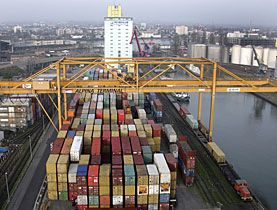Swiss ocean gateway seeks bigger role

Basel's docks are being promoted as the "gateway to Switzerland" at a German port festival but they need more support from the government, harbour authorities say.
The city of Basel is representing Switzerland at the Hafengeburgstag (harbour birthday) festival in Hamburg over the weekend. The event, billed as the largest of its kind in the world, attracts up to one million people.
Swiss Transport Minister Moritz Leuenberger spoke at the opening of the festival on Friday. The director of Basel’s port, Hans-Peter Hadorn, who is also taking part, says however that politicians still underestimate the value of the Rhine and its efficient rail and road connections.
“We do not have any traffic jams and we have ample loading capacities,” he told swissinfo.ch. Thirteen per cent of Swiss imports arrive via the Rhine, compared with 17 per cent by rail and 17 per cent via pipelines, such as oil and gas.
At the beginning of May, the number of barges leaving this “southernmost port of the North Sea” – as Basel residents like to call it – and headed northwards was low, but the dip in traffic was “deceptive”, according to the port director.
“Overall traffic even increased in the first quarter of 2009,” he pointed out, noting though that the situation is very delicate due to the economic crisis.
The positive results seem to be due to a single factor: oil. Low prices have prompted customers to top up their tanks, but after a long winter, reserves have dropped, meaning more shipping along the Rhine.
But this won’t last, according to Hadorn.
Eco-friendly
“In Rotterdam or Antwerp, a decline in demand has already been felt and oil tankers can no longer offload their cargo. It will take a few months for the effects to be felt up the river,” he said.
Shipping of other materials however leaves no doubt about the effects of the crisis. For iron and metal it has decreased by at least 50 per cent, for containers by 13.5 per cent.
“Up until September 2008, two trains left every day, each carrying 1,600 tonnes of metal for the Italian car industry. Today it is three to four trains per week.”
The Swiss port nevertheless expects demand to go up in the coming years.
It is the “most environmentally friendly method of transport”, says the centre-left Social Democrat parliamentarian Claude Janiak, who has called for greater recognition of Rhine shipping in Swiss transport policy.
Rotterdam is planning to increase its capacity from 11 to 21 million TEU tonnes (container measurement unit) in 2015. “A port cannot master this new challenge on its own,” the Basel port authority noted recently.
Shipping or rail
Collaboration has been established with the ports of Weil am Rhein in Germany and Mulhouse in France, even if it is restricted to marketing operations so far. Partners from the three countries have formed RheinPorts, the second largest infrastructure body along the Rhine after Duisburg in Germany (not including sea ports).
The Basel port authority is eagerly awaiting a government response to a proposal Janiak has made, in which he called on the authorities to make the same financial contribution to shipping infrastructure as it does to the railways.
“This is not about pitting river shipping against rail even though the aggressive pricing policy of the Federal Railways cargo service has harmed shipping in the past,” Janiak told swissinfo.ch.
“But there is no reason why these two modes of transport cannot be operated under the same conditions.”
The cabinet must also present a report on Switzerland’s shipping policy after the summer, first requested by Basel parliamentarian Anita Fetz in 2006.
Has the Rhine been neglected as an axis of transport in Switzerland? “We tend to forget about it, because it starts at the border,” admits Hadorn.
Ariane Gigon in Basel, swissinfo.ch (adapted from French by Jessica Dacey)
Four ports shared the Basel market before 2006: Kleinhüningen, St Johann (the oldest of the four), Birsfelden and Muttenz-Au. They merged to form the Swiss Ports of the Rhine.
Around 9 million tonnes of exports are loaded and unloaded each year through these docks – 15% of Switzerland’s external trade.
13% of the total merchandise arriving in Switzerland passes via Basel, compared to 17% by rail and 17% by pipeline.
A boat 110metres long carrying 2,800 tonnes on average is the equivalent of 35 rail wagons or 147 28-tonne lorries.
Around 2,000 people are employed at Rhine ports in Switzerland.
Hafengeburgstag is the biggest port festival in the world and welcomes around one million visitors over three days.
Apart from Basel port, Cern’s Large Hadron Collider, watch brands, food specialities and the catamaran project PlanetSolaire will also be on show.
Transport Minister Moritz Leuenberger will take part in the opening ceremony on May 8.

In compliance with the JTI standards
More: SWI swissinfo.ch certified by the Journalism Trust Initiative












You can find an overview of ongoing debates with our journalists here . Please join us!
If you want to start a conversation about a topic raised in this article or want to report factual errors, email us at english@swissinfo.ch.